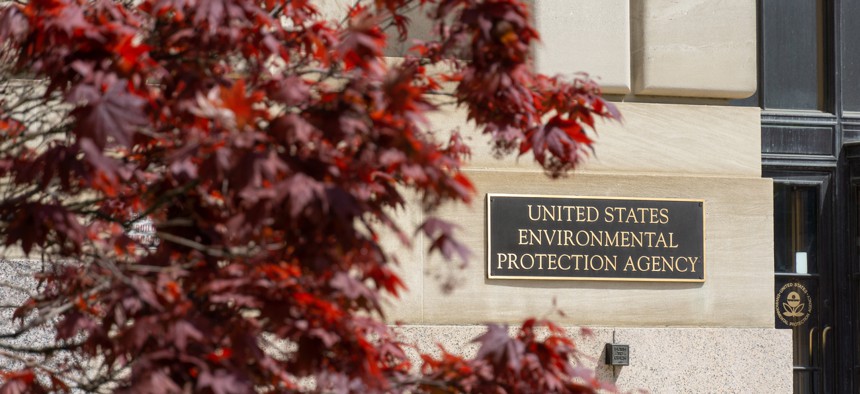
DanielJohn / Shutterstock.com
IG Warns of 'Ruinous' Relationship With EPA Over Failures to Cooperate
EPA chief of staff told investigators "Do not contact me further" unless they agreed to provide advance notice of the information sought, counter to investigative practice.
The Environmental Protection Agency’s official watchdog put Trump administration officials on notice for their failure to cooperate with audits and investigations, saying the behavior could destroy oversight of the office.
EPA Chief of Staff Ryan Jackson has cut off communication with the agency’s inspector general, Charles Sheehan, the IG said in a letter to Administrator Andrew Wheeler released on Wednesday. Jackson’s failure to cooperate with the IG’s office in two separate instances rose to the level of a “flagrant problem,” Sheehan said, requiring him to write the memorandum known as a “seven-day letter”—a reference to the amount of time EPA has to notify Congress of the allegations.
The dispute relates to two IG probes, one concerning EPA blocking a career official from testifying before Congress and another regarding an unnamed personnel issue. In the former case, Jackson refused to say how he knew in advance what the career employee would say in her testimony. In the latter, Jackson said he had dealt with hundreds of personnel matters since joining EPA and deserved to know more details to help prepare before submitting himself to questions.
For their part, the OIG said it “patiently sought multiple times over protracted periods” to contact Jackson for cooperation and brought their concerns about his failure to respond to Wheeler and other leaders. Sheehan said he met with EPA officials to “press the grave character of failure to fully cooperate with audits and investigations” and to offer “minor accommodations” to Jackson. No EPA official had contacted the IG since Oct. 21 by the time Sheehan sent the letter on Oct. 29, he said.
The IG issued a sharp warning about the fallout that would result if EPA leadership continues to not cooperate with the IG as the watchdog fulfills its oversight responsibilities at the agency.
“To countenance open defiance even in one instance—much less two, both by a senior official setting precedent for himself and all agency staff—is ruinous,” Sheehan said.
Email exchanges released by the IG showed Jackson’s refusal to meet with investigators without first knowing the subject matter. The investigators responded he was not entitled to know that information, but could assume it would pertain to similar topics as a July interview Jackson had cut off prior to its conclusion.
“Well, then I am not meeting with you or your staff if you will not tell me the subject of the conversation so that I may prepare for it,” Jackson responded in an Oct. 9 email. “The fact that you cannot and will not provide the subject of what you want to meet with me about is unprofessional, and I'm not participating.”
He added unless the IG’s office was prepared to offer clarifying information, “Do not contact me further.”
Under federal law, EPA is required to provide the letter to relevant congressional committees.
“As it is for the agency itself, information is the oxygen for the Inspector General's office,” Sheehan wrote. “If information is choked off, we cannot fulfill our congressional charter and produce work of the rigor and quality expected by the American public.”
President Trump has faced criticism for questioning the role of inspectors general, leaving posts vacant and failing to provide what some watchdog groups view as adequate funding. His administration has also rebuffed independent investigators on multiple occasions and engaged in several public spats with inspectors general. The EPA IG has also butted heads with the agency over the chief financial officer destroying notes investigators had sought.
Jackson wrote a responsive letter to Wheeler, detailing the ways in which he previously cooperated with the IG and voicing his various concerns with what he viewed as an overly aggressive approach by investigators. He explained that he has already met with the IG on the matters at hand.
“I have neither delayed nor refused to fully cooperate with the EPA's inspector general,” he wrote, noting he has met with the IG at least 27 times since joining the agency in 2017. “I have repeatedly advised the OIG that I would respond to them concerning their questions on these matters or any others when I have information concerning the topics they wish to discuss.”
In yet another letter, EPA General Counsel Matthew Leopold responded to Wheeler’s request for a legal opinion by stating the “accommodation process” between the IG and Jackson was still “in progress” when Sheehan issued his notice. Wheeler, according to Leopold, had offered to make Jackson available for more interviews but the IG refused to withhold the “seven-day letter.” Leopold concluded that Wheeler had fulfilled his obligations under federal law and further suggested the IG’s audit of the congressional testimony issue could raise constitutional concerns regarding separation of powers.
In a response to the general counsel response, the inspector general said late Thursday afternoon its investigatory powers are "unambiguous." The IG refuted that EPA has agreed to make Jackson available, saying he “continues to fail to fully cooperate” and there was “no agency accommodation ‘progress’ whatsoever” when the IG issued the seven-day letter.
Leopold’s letter “offers free rein to agency staff to refuse OIG requests for information,” the IG said. He added EPA, through its general counsel, has misconstrued federal law, cited outdated legal precedents and dissenting opinions, and falsely claimed the investigators do not have power that is directly conveyed to them in statute.







